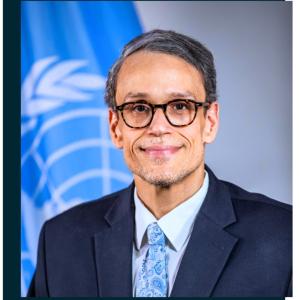H.E Vice President of The Gambia Muhammed B.S Jallow
Honorable Ministers
Deputy Speaker of the National Assembly
Permanent Secretaries,
Development Partners and members of the diplomatic and consular corps
Heads of UN Agencies
UNFPA Representative,
Executive Director National Population Commission Secretariat
Distinguished Guests
Young People of the Gambia
Ladies and Gentlemen
It is a privilege to join you today for the national launch of the 2025 State of World Population Report and the commemoration of World Population Day.
This day reminds us that population is not merely about numbers — it is about people and their rights. It is about ensuring that every person, particularly young people, have the freedom and means to make informed decisions about their lives, their families, and their futures.
The 2025 State of World Report highlights an urgent truth: the greatest population challenge we face today is the denial of reproductive choices to millions — women, men, and especially young people — whose aspirations are blocked by inequality, discrimination, and lack of opportunity.
Here in The Gambia, young people hold the key to the country’s sustainable development. Their potential is immense, but their path is not without obstacles — unemployment, gender inequality, limited access to quality health services and education, and concerns about what the future holds.
The essence of the UN’s vision under Our Common Agenda — is a renewed social contract that places people, especially young people, at the centre of development. It is about building trust, fairness, and futures worth believing in.
Our UN sustainable Development Cooperation Framework provides our roadmap for translating these commitments into concrete action in line with the Green and Recovery Focused National Development Plan. Under its strategic priorities — particularly those focused on human capital development, economic transformation, and governance — we have a clear mandate to address population dynamics as a driver of sustainable development. The Framework recognizes that reaping the demographic dividend is not automatic; it requires deliberate investment in young people’s capabilities and choices including their reproductive health choices.
We must be uncompromising in our commitment to implement the Cooperation Framework’s outcomes: ensuring universal access to sexual and reproductive health services, eliminating child marriage, expanding quality education and skills training, and creating decent employment opportunities.
The Cooperation Framework’s emphasis on leaving no one behind is not merely aspirational language; it is a binding commitment to ensure that every young Gambian — regardless of gender, location, or socioeconomic status — has the power to determine their reproductive choices and life trajectory.
On behalf of the entire United Nations system in The Gambia, I commend the Government, UNFPA, and all partners for shining a light on these issues through this year’s State of World Population report. As we reflect on its findings, I call on all partners — government, private sector, civil society, and communities — to recommit to the Sustainable Development Goals and ensure that every young person in The Gambia has the agency, resources, and support to shape a future of dignity, resilience, and hope.
Let us remember: the clock is ticking — and achieving the SDGs by 2030 depends on the choices we make today, and the choices young people are allowed to make for themselves.
As we celebrate World Population Day, let us pledge to create a Gambia — and a world — where young people are empowered, where families are planned by choice and not by chance, and where no one is left behind.
Thank you.


















